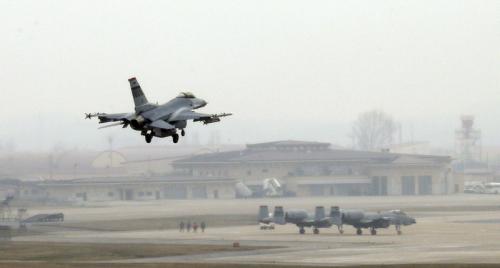Phuket Gazette World News: Korea crisis; UN passes small arms treaty; Israel fires on Syria; Four charged over Brazil nightclub fire

– World news compiled by Gazette editors for Phuket’s international community
PHUKET: The Pentagon said on Tuesday that a second U.S. guided-missile destroyer had taken position in the western Pacific on a missile defence mission, as tensions rise over North Korea’s threats of war against the United States and its ally, South Korea.
The announcement is the latest confirmation of minor adjustments to the posture of the U.S. military, which is seeking to reassure allies in Seoul and Tokyo of American military capabilities to respond to any moves by Pyongyang.
U.S. defence officials announced on Monday that the USS John McCain, an Aegis-class guided-missile destroyer used for ballistic missile defence, was being put into position to operate off the Korean peninsula.
Pentagon spokesman George Little said on Tuesday that the McCain had arrived at a “pre-determined location” in the western Pacific. He added that another destroyer, the USS Decatur, had also taken position in the western Pacific “to perform a missile defence mission as assigned by our combatant commander.”
“They [the McCain and the Decatur] will be poised to respond to any missile threats to our allies or our territory,” Little said.
The Pentagon denied reports that a floating, X-band radar was being deployed in the waters off Japan, saying no decisions had been made about what would be done with the radar once at-sea testing in the region was finished.
The radar is used to track an adversary’s missiles as part of a missile defence system.
“It’s incorrect to tie the radar at this point to what’s happening on the Korean peninsula right now,” Little said.
News of the latest U.S. move to bolster missile defences around the Korean peninsula came as North Korea said on Tuesday it would revive a mothballed nuclear reactor able to produce bomb-grade plutonium (see below).
United Nations Secretary-General Ban Ki-moon said that the crisis over North Korea had gone too far and he appealed for discussion and negotiation. “Nuclear threats are not a game. Aggressive rhetoric and military posturing only result in counter-actions, and fuel fear and instability,” Ban, a South Korean, told a news conference during a visit to Andorra.
PHUKET: North Korea said on Tuesday it would revive a mothballed nuclear reactor able to produce bomb-grade plutonium but stressed it was seeking a deterrent capacity and did not repeat recent threats to attack South Korea and the United States.
United Nations Secretary-General Ban Ki-moon said the crisis over North Korea had gone too far and he appealed for dialogue and negotiation to resolve the situation.
“Nuclear threats are not a game. Aggressive rhetoric and military posturing only result in counter-actions, and fuel fear and instability,” Ban, a South Korean, told a news conference during a visit to Andorra.
The Pentagon, meanwhile, said another U.S. guided-missile destroyer had taken position in the western Pacific to assist with missile defence, as tensions rise over North Korea’s threats against the United States and its ally, South Korea.
The crisis flared after Pyongyang was hit with U.S. sanctions for conducting a third nuclear test in February and the United States and South Korea staged military drills that North Korea viewed as “hostile.”
Pyongyang then threatened a nuclear strike on the United States, missile strikes on its Pacific bases and war with South Korea, prompting Washington to bolster forces in the region.
The state-owned KCNA news agency announced on Tuesday that North Korea would relaunch all nuclear facilities for both electricity and military uses.
One of the most isolated and unpredictable states in the world, North Korea carried out its third nuclear test since 2006 but is seen as some years away from producing a deliverable nuclear weapon, although it claims to have a deterrent.
A speech by the North’s young leader, Kim Jong-un, given on Sunday but published in full by KCNA on Tuesday, appeared to dampen any prospect of a direct confrontation with the United States by emphasizing that nuclear weapons would ensure the country’s safety as a deterrent.
“Our nuclear strength is a reliable war deterrent and a guarantee to protect our sovereignty,” Kim said. “It is on the basis of a strong nuclear strength that peace and prosperity can exist and so can the happiness of people’s lives.”
Meeting in Washington, U.S. Secretary of State John Kerry and South Korean Foreign Minister Yun Byung-se stressed their countries’ military readiness and said denuclearisation was the only way forward for North Korea.
“What Kim Jong-un has been choosing to do is provocative, it is dangerous, reckless and the United States will not accept [North Korea] as a nuclear state,” Kerry said.
The Obama administration’s deployment of advanced aircraft and warships to South Korea was a signal “that the United States will defend our allies and that we will not be subject to irrational or reckless provocation,” he said.
Kerry, who will visit South Korea next week, reminded the North Koreans that “they have an option, and that option is to enter into negotiations for denuclearisation … and to begin to focus on the needs of their people.”
Kim’s speech, delivered to the central committee meeting of the ruling Workers Party of Korea, hinted at a small shift away from threats against Seoul and Washington, but it remained some distance from calling any kind of end to the crisis.
“The fact that this [speech] was made at the party central committee meeting, which is the highest policy-setting organ, indicates an attempt to highlight economic problems and shift the focus from security to the economy,” said Yang Moo-jin of the University of North Korean Studies in Seoul.
Plutonium production
But if Pyongyang indeed restarts the nuclear facilities, it would have longer-term implications for the region’s security.
Reactivating the aged Soviet-era reactor at the Yongbyon nuclear plant would yield plutonium, a tested path to stockpile more fissile material than a uranium enrichment program.
The White House criticized the move. “North Korea’s announcement that it will reopen or restart its nuclear facilities at Yongbyon is another indication of its pattern of contradicting its own commitments and its pattern of violating its international obligations,” spokesman Jay Carney said.
The United States is urging Russia and China to do more to rein in North Korea, Carney said.
It was unclear how quickly Yongbyon, whose cooling tower was destroyed as part of an earlier denuclearisation deal with major powers, would take to restart.
It was also impossible to verify whether Yongbyon remained connected to North Korea’s antiquated electricity grid at all.
“It was a reactor that was nearing obsolescence with a cooling tower that wasn’t functioning properly when it was blown up. It could mean they’ve been rebuilding quite a few things,” said Yoo Ho-yeol, North Korea specialist at Korea University in Seoul.
The move to restart the reactor undermines China’s stated aim of restarting denuclearisation talks on the Korean peninsula, prompting a foreign ministry spokesman in Beijing to express regret at the decision.
As
— Phuket Gazette Editors
Latest Thailand News
Follow The Thaiger on Google News:


























